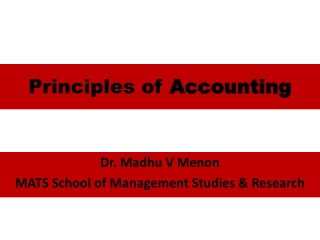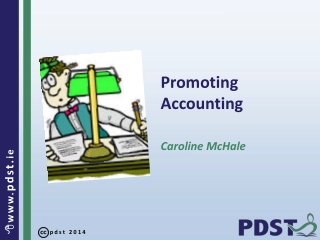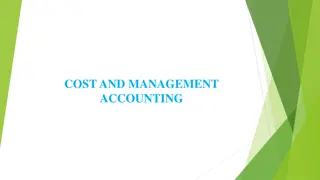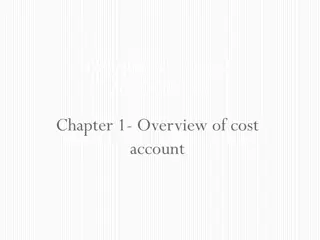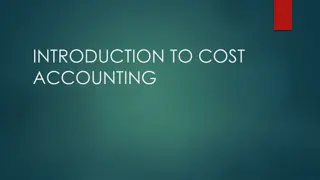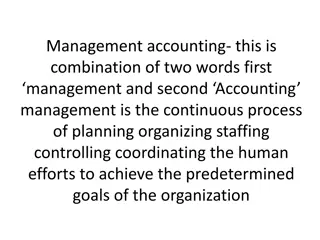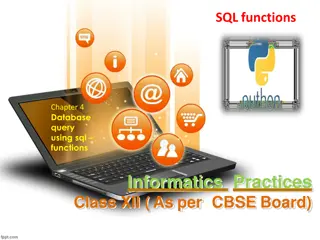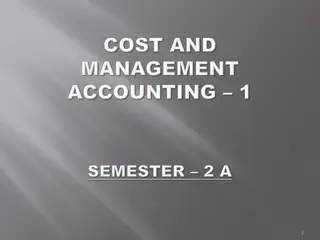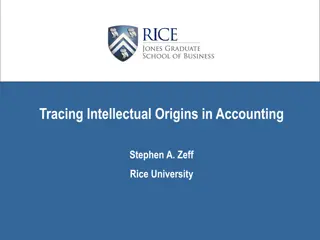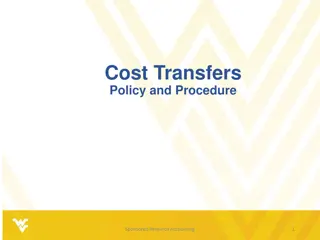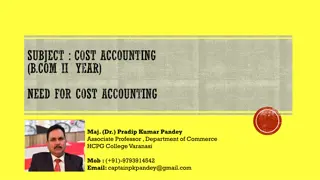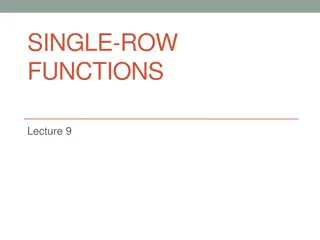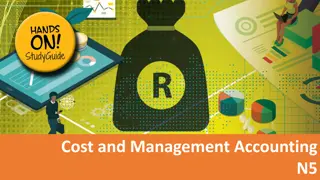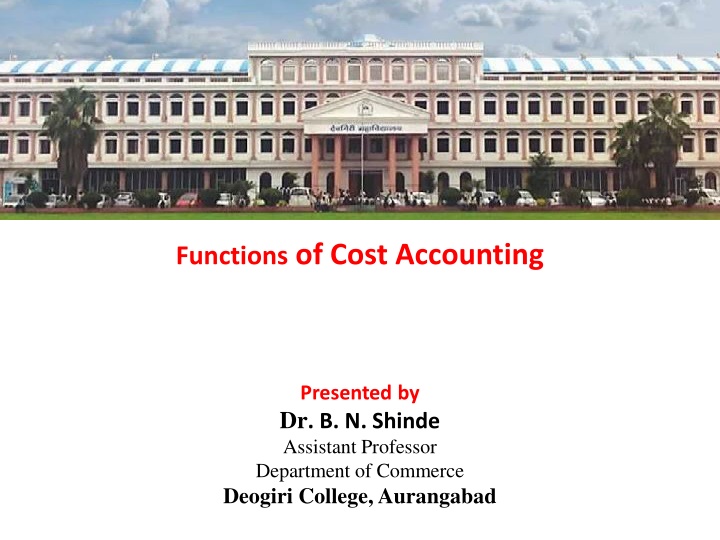
Key Functions of Cost Accounting in Business Operations
Understanding the functions of cost accounting is crucial for businesses to ascertain costs, control expenses, aid management decisions, set selling prices, and manage inventory effectively. Cost accounting plays a vital role in determining the true cost of production, monitoring and controlling costs, providing essential data for managerial decision-making, setting competitive selling prices, and optimizing inventory management practices. By utilizing cost accounting techniques, businesses can enhance their financial performance and operational efficiency.
Download Presentation

Please find below an Image/Link to download the presentation.
The content on the website is provided AS IS for your information and personal use only. It may not be sold, licensed, or shared on other websites without obtaining consent from the author. If you encounter any issues during the download, it is possible that the publisher has removed the file from their server.
You are allowed to download the files provided on this website for personal or commercial use, subject to the condition that they are used lawfully. All files are the property of their respective owners.
The content on the website is provided AS IS for your information and personal use only. It may not be sold, licensed, or shared on other websites without obtaining consent from the author.
E N D
Presentation Transcript
Functions of Cost Accounting Presented by Dr. B. N. Shinde Assistant Professor Department of Commerce Deogiri College, Aurangabad
Functions of Cost Accounting 1. Ascertainment Of Cost Cost ascertainment is an important function played by cost accounting. It records each and every element relating to production activity systematically like fixed and variable cost, direct and indirect cost. The data collected by cost accounting is analyzed by managers in determining the true and actual cost of products. Nowadays businesses manufacture a wide and large range of products, in the absence of cost accounting, it becomes difficult for them to find out the real cost of their products.
Functions of Cost Accounting 2.Controlling Cost Cost accounting helps the organization in controlling its cost. Organization sets standards for their cost which are treated best for the achievement of goals and objectives. Cost accounting information related to the cost of each step of production. This information collected is then compared with standards already set and if any deviation is found, necessary steps are taken. Therefore it helps in the detection of deviations in cost and time controlling them. supplies detailed
Functions of Cost Accounting 3. Aid To Management Cost accounting supports the managers in performing their duties. It supplies them all necessary and relevant data to the managers periodically that may be monthly, quarterly or half-yearly. Managers analyze the detailed cost information supplied by cost accounting and accordingly take decisions. implement policies in the organization as per the information collected. It helps them in taking strategic decisions and better management of organization affairs. They framed and
Functions of Cost Accounting 4. Setting Up Selling Prices Fixing up the right selling price for its product is a challenging task for every business organization. Cost accounting helps in the ascertainment of the accurate cost of production of products. By adding the profit margin to the real cost company can easily fix the selling cost for its products. Businesses under cost accounting use different techniques like batch costing, job costing, service, and output costing for determining the selling price of its products.
Functions of Cost Accounting 5. Inventory Control Cost accounting helps in controlling the inventory by recording each item of inventory. It maintains complete records of all raw materials so that timely proper order for raw materials can be made. It avoids all situations like over-ordering and under-ordering of raw materials. Also, the complete record of finished goods is made so that accordingly production process can be regulated. It avoids wastages of resources and the occurrence of losses for the organization.
Functions of Cost Accounting 6.Measurement Of Efficiency Cost accounting helps in measuring the efficiency of business operations. Managers can easily acquire information regarding production cost which can be analyzed to find out how efficiently a business is running. It helps in avoiding wastage of different resources of the organization through proper monitoring. It uses a standard cost method in measuring the efficiency of each process, product and department.
Functions of Cost Accounting 7. Discloses Profitable And Non-Profitable Activities Cost accounting gives clear details of each activity of business to managers that which one is profitable and which one not. It supplies all detailed information regarding the cost of each product of the business. Managers by comparing the cost of the product with demand in the market can decide whether to continue its production or not. It, therefore, helps in determining profitable and non-profitable activities of business by managers.
Disadvantages of Cost Accounting 1. Lack Of Uniformity Cost Accounting has a lack of a uniform procedure. It may bring different results from the same data. So, it means that cost accounting has ineffective results. 2. Costly Cost Accounting is a costly process. It requires many formalities to settle down this process and also needs lots of paper works which makes it quite costly.
Disadvantages of Cost Accounting 3. Ignores Futuristic Situation Cost Accounting ignores the futuristic situation of the product cost. It only records past cost records whereas management is taking decision regarding the future. Therefore cost data are not very useful. 4. Uses Secondary Data Cost Accounting uses secondary data from financial statements for various calculations like standard cost. It does not include primary data or short term data. That s why cost accounting does not provide effective results.
Disadvantages of Cost Accounting 5. Only Bring Out The Cost Of Goods Cost Accounting is not able to find the financial status of the company. It cannot determine the operational efficiency of a business and ascertains only the cost of goods. For assessing the financial position, we need to depend upon financial accounting. 6. Unable To Determine Tax Liability Cost Accounting cannot find out the tax liability of the company. It cannot be treated as a basis for calculating it. Financial accounting is needed for finding out the tax liability.
Difference between Financial Accounting and Cost Accounting Both accounting are complementary to each other. Preparation of both accounts is helping the organization to the smooth running of the business. The difference between Cost Accounting and Financial Accounting is given below:
Cost Accounting 1. It helps us to ascertain the cost of goods produced. 2. It provides required information to the management. 3.It need not be followed by a system of external audit.
Cost Accounting 4.It classifies the costs into material, labour, fixed overhead and variable overhead. 5.Cost sheet is main format of cost accounting 6.It does not form a basis for tax assessment. 7. Variance analysis is to identify the favourable and adverse difference between standard cost and actual cost. 8.Cost accounting facilitates the presentation of cost information at regular intervals.
Cost Accounting 9.Profit or loss is estimated on specific product, branch, department or job. 10.It is an effective control device. 11. Unit wise accounting is also prepared.
Financial Accounting 1. It helps us to know operational results and financial position of business. 2. It provides information parties involved in business internally and externally. 3. Audit is a statutory obligation.
Financial Accounting 4.Transactions are divided into debit and credit terms. 5.Trading and Profit & Loss Account and Balance Sheet are two consolidated financial statements. 6.It forms a basis for deciding the tax liabilities of the business.
Financial Accounting 7.It records only actual transactions occurring in the course of business operations. 8.Financial statements are annually presented. 9.It presents operational results of the entire business. 10.Financial accounting is not a control device. Rather, accounting ratios can be computed with financial accounting. 11.Monetary units alone are yardstick of financial accounting.

